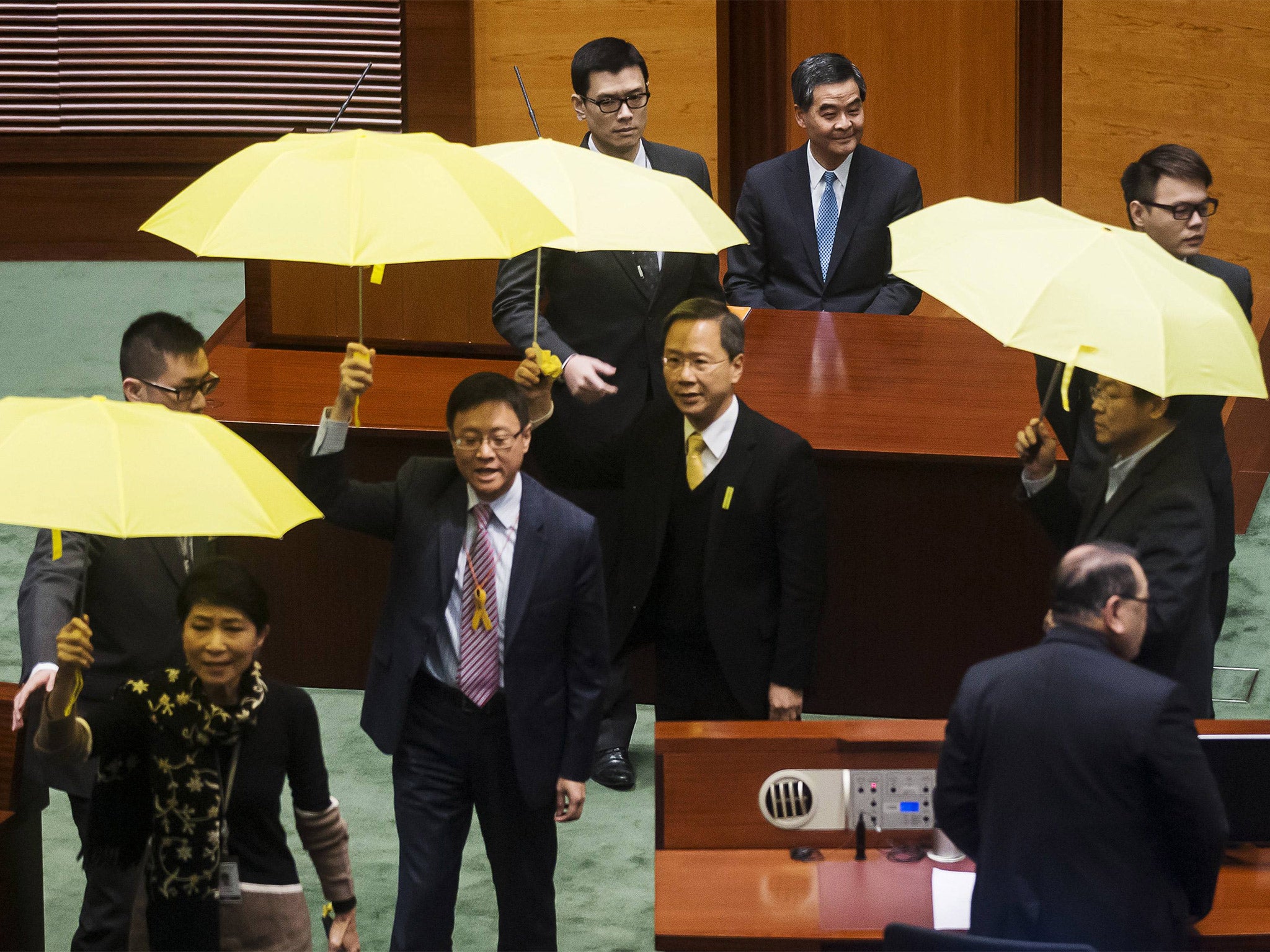Hong Kong protests: Chief Executive Leung Chun-ying warns island could yet descend into 'anarchy' if pro-democracy demonstrations continue
Lawmakers unfurled yellow umbrellas and banners saying 'shame on you' as Mr Leung made his first annual policy speech since the mass sit-ins that demanded greater freedoms in the Chinese territory

Your support helps us to tell the story
From reproductive rights to climate change to Big Tech, The Independent is on the ground when the story is developing. Whether it's investigating the financials of Elon Musk's pro-Trump PAC or producing our latest documentary, 'The A Word', which shines a light on the American women fighting for reproductive rights, we know how important it is to parse out the facts from the messaging.
At such a critical moment in US history, we need reporters on the ground. Your donation allows us to keep sending journalists to speak to both sides of the story.
The Independent is trusted by Americans across the entire political spectrum. And unlike many other quality news outlets, we choose not to lock Americans out of our reporting and analysis with paywalls. We believe quality journalism should be available to everyone, paid for by those who can afford it.
Your support makes all the difference.Beijing’s man, Leung Chun-ying, has faced repeated calls to resign, becoming a common target for civic vitriol amid unprecedented public protests for greater freedoms in Hong Kong. And today, in his first visit to face politicians this year, he warned the island could yet descend into “anarchy” if protests continue.
The Hong Kong Chief Executive’s first annual policy speech since the mass sit-ins which rocked the Chinese territory for almost 80 days was badly received. After insisting that “the rule of law is the foundation of Hong Kong”, Mr Leung said: “As we pursue democracy, we should act in accordance with the law, or Hong Kong will degenerate into anarchy.”
In the Legislative Council not all politicians stuck around to listen to Mr Leung, widely viewed as a mouthpiece for Chinese interests. Around 20 council members walked out to show their anger at Beijing’s framework for elections in 2017 and Mr Leung’s handling of the recent “Occupy” protest movement. After unfurling yellow umbrellas indoors – the main symbol of the pro-democracy movement – the lawmakers chanted for his resignation and shouted: “I want genuine universal suffrage.” They left the chamber, carrying with them long yellow banners with slogans on and shouting “shame on you”. One member, Raymond Chan, was carried off by security guards.
Mr Leung later pointed to the process ahead. He said: “What we have to focus on is to realise the opportunity that we now have to elect for the first time in Hong Kong’s history the head of Hong Kong Government by universal suffrage. It has never, never taken place before, but we have now an opportunity to do it in 2017. And if we can convince a few more members of Legislative Council that they should listen to the people, because the people want it... then there will be a reality in a couple of years’ time.”
The occupations, at three main sites across Hong Kong, were primarily to demand open nominations for the election of Leung’s successor in 2017.
Under the framework put forward by Beijing in August, Hong Kongers will for the first time directly elect their leader. But anyone hoping to stand would need majority approval from a 1,200-strong election committee stacked with Beijing loyalists.
The protests brought tens of thousands of people on the streets and caused violent clashes with police.
Neither Mr Leung nor Beijing gave any concessions on the issue. Protest leaders have made clear they consider the matter far from over and the plan still has to be voted on the the legislative council later this year. Though the Chief Executive’s image took something of a battering, he was predictably backed by the Chinese leadership, which denounced the protesters as lawless radicals.
The annual policy address has been a key platform for the city’s leaders to hand out billions to the poor in the form of tax breaks, or to signal shifts in economic, property and political policies. Mr Leung also promised to tackle the territory’s housing crisis. He also promised, among other things, action on helping poor retirees, reducing food waste and getting more women into government jobs.
The address came as the aftershocks of the protests are still being felt, with many protesters still due in court. It also came after the government’s regular invocation of the Rule of Law came under fire from a top Hong Kong lawyer. In a speech marking the start of the legal year this week, Paul Shieh, Chairman of the Hong Kong Bar Association, raised concern over “an increasing tendency on the part of the executive in Hong Kong, in its public statements, to emphasise “the ‘obey the law’ aspect of the Rule of Law”.
Join our commenting forum
Join thought-provoking conversations, follow other Independent readers and see their replies
Comments